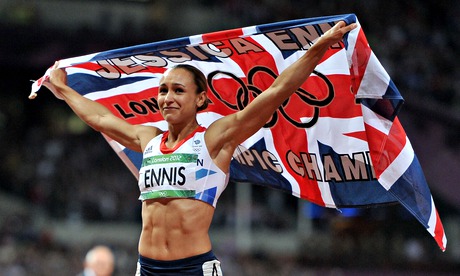
The vacuous sales pitch that hosting the 2012 Olympics in London would inspire the nation to be more active has finally suffered a terminal blow, with the revelation in Sport England’s latest half-yearly survey that 220,000 fewer people did sport of any kind than in the previous six months. The total number of adults taking part in sport now stands at 15.5m, 35.5% of England’s population. So, three years since the nation thrilled to watch Mo Farah, Jessica Ennis-Hill and the rest of Team GB, 64.5% of over-16s are doing no sport or exercise for even half an hour each week. Sport England’s figures show that the number of people swimming has fallen by 729,000 in the last decade.
This is not a surprise. Despite research by Tony Blair’s policy unit confirming that hosting a televised mega-event does not greatly encourage regular people to do more sport, in 2005 Blair went as prime minister to the International Olympic Committee in Singapore and made exactly that claim. His and the next coalition government sanctioned spending £9.3bn public money on three weeks of elite sports, and neither Blair, Lord Coe nor anybody else who took the plaudits is being held to account for the failure to build a participation legacy.
West Ham United are of course the great Olympic winners – taking possession next year, for a relatively modest rent, of the stadium built and converted for football with £640m of public money, a fabulous boost to the value of their shares for the club’s owners David Sullivan and David Gold, and their long-term executive, Karren Brady, now ennobled as a Conservative peer.
Confronted by the figures showing the drop in participation, the newly appointed sports minister, Tracey Crouch, said she was “very disappointed” and pledged to urgently develop a new strategy, and “look to take a more joined-up approach to sport and physical activity across Whitehall”.
If she is serious, she will need to see beyond the minutiae of earnest programmes run by sports governing bodies, funded by Sport England’s annual budget of just £300m, mostly from the national lottery. The participation figures note a wide, permanent inequality in sports participation between economic groups. Currently 39% of wealthier classes do regular sport, a 1% increase since 2005. A markedly lower proportion, 26%, of less well-off people do sport: a 1.5% drop since 2005. So almost 75% of people in poorer sections of society do no regular sport at all.
The Olympics were themselves a glamorised exercise in inequality, given that 41% of Team GB’s medal-winning athletes had been to private schools compared with 7% of pupils nationally.
The divide between state schools’ mostly cramped sporting provision and the lavish playing fields of Britain’s public schools – attended by most of Crouch’s government colleagues – has only become more pronounced. After a scandalous decline under the previous Conservative administration, PE in state schools was slowly rebuilt by the last Labour government from just a quarter of pupils doing two hours a week in 1997, to 93% in 2010.
One of Michael Gove’s first acts as education secretary in 2010 was to abolish school sport partnerships, which had worked cost-effectively to glue activity together in local areas. David Cameron mocked as “pathetic” the number of pupils doing competitive sport at state schools under Labour, but Gove also cut the requirement for schools to document it, so now we cannot know how many take part under the Tories.
The class divide is reflected in adult life too. Fitness sessions in private gyms were down in the last six months, but exercise generally is becoming more middle class, taken by people with time, some money and a standard of living that includes sport in the routine.
Experts such as Chris Gratton, an adviser to Sport England, have found consistently that poverty and inequality are crucial barriers to people taking part in sport. To genuinely help people be more active and experience sport’s mental and physical health benefits requires decent local facilities, space and sports development staff, combined with awareness campaigns and restriction on the food and drink industry’s relentless marketing of unhealthy products.
If Crouch seeks a new strategy across Whitehall, she will need to talk to George Osborne, whose multibillion-pound cuts to local authorities are biting into sports facilities and seeing staff laid off. The chancellor’s plans for £12bn welfare cuts will further prevent millions of people from leading healthier lives.
Sport always reflects the culture it is played in, and sadly the latest figures expose an unequal, mostly sedentary nation, being led in the wrong direction.

